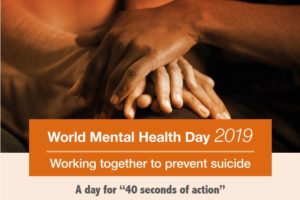
“The saddest people always try their hardest to make people happy because they know what it is like to feel absolutely worthless, and they don’t want anyone else to feel like that.” Robin Williams.
Thankfully, in the five years since the comedian Robin Williams took his own life, there has been more attention paid to mental health than previously. Ignored or demonised for centuries, mental illness is increasingly seen as a mainstream public health challenge: every 40 seconds, someone commits suicide.
Network for Africa is trying to meet this challenge in places where even getting an aspirin or a band aid are difficult. Yet, mental health is a priority, even in the poorest and most remote communities, because of the profound damage it can inflict on future generations. People in northern Uganda have endured twenty years of civil war, when they were herded into camps, and terrorised. Their social coping mechanisms were shattered, with alcoholism and domestic violence damaging many marriages.
Sally’s story
Sally’s story illustrates the problems faced by mothers, while trying to keep their children safe, despite the abusive men in their lives. The low status of women in Sally’s society has made it difficult for her to guarantee her children a safe upbringing. Her first husband, with whom she had four children (because regular child-bearing is expected of all women) was abusive. She and the toddlers would hide in the bush for days while her husband pursued her, armed with a spear.
However, leaving such a marriage is not easy in a culture where women only have a position in society if they are wives. Despite their legal rights to property and civil rights, the reality is that tradition takes precedence. Many women aren’t even aware they have the most basic rights under their own country’s laws – and men are unlikely to enlighten them, so long as tradition benefits men.
For these reasons, Sally married a second time, having three more children with a man who already had two wives and who was repeatedly violent. In desperation, Sally broke social convention and fled to her ancestral village, along with her seven children, hoping her brothers would help her. They had inherited land from their parents, but they refused to allow Sally to farm any of it with them. They ordered her to return to her husband.
At this point, Sally felt worthless and hopeless. When she attempted suicide, a friend advised her to visit the health clinic. There, she met one of our counsellors. Soon she was getting regular counselling. Sally says the sessions helped her to think clearly and positively about possible solutions. As a result, she went to her clan leader, asking him to talk to her brothers. The clan leader convinced the brothers to allow Sally to have one of the family’s plots of land. She moved there with her children, and is now busily farming and supporting her family.
“My lovely children would have been orphans now if I had committed suicide and thank you so much for listening to my problem, visiting my home and helping me to come out of this problem” she says.
40 seconds of action
Please help Network for Africa to continue its work. October 10th has been designated a World Mental Health day of action. People are urged to spend 40 seconds helping to offer hope. Please spend your 40 seconds clicking https://network4africa.org/donate/ to donate. Thank you for your help. Your support transforms lives.